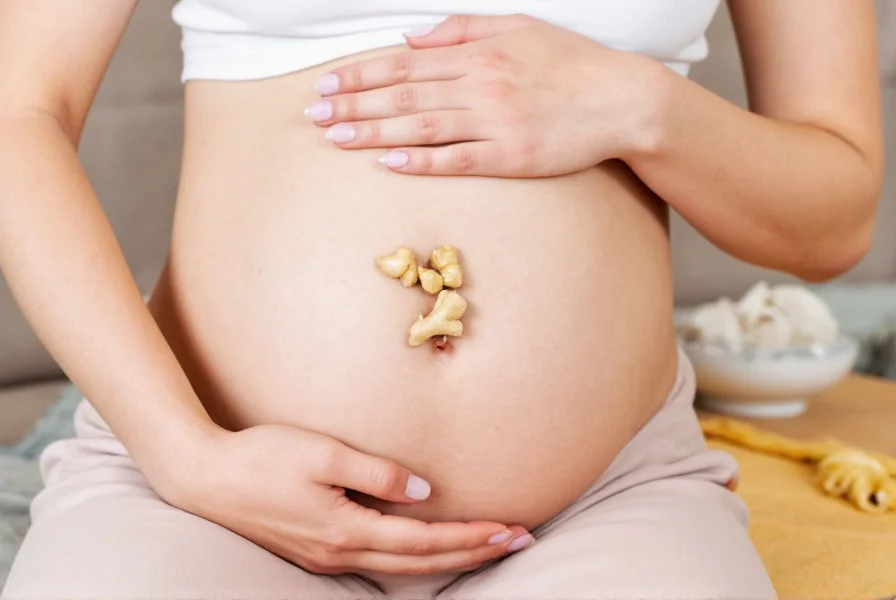Many expectant mothers turn to natural remedies like ginger tea to manage morning sickness, one of pregnancy's most common discomforts. As a pregnancy-safe beverage option, ginger tea has gained popularity for its potential to ease nausea without pharmaceutical intervention. Understanding the appropriate consumption guidelines ensures you can safely enjoy this traditional remedy throughout your pregnancy journey.
What Medical Research Says About Ginger Tea and Pregnancy
Multiple clinical studies have examined ginger's effectiveness and safety during pregnancy. A comprehensive 2020 review published in Nutrients analyzed 11 clinical trials involving over 1,300 pregnant participants. The research concluded that ginger supplementation significantly reduced nausea severity compared to placebo, with no increased risk of adverse pregnancy outcomes.
The American College of Obstetricians and Gynecologists includes ginger as a recommended non-pharmacological option for managing nausea and vomiting of pregnancy. Similarly, the National Health Service (NHS) in the UK acknowledges ginger as a safe natural remedy for morning sickness when consumed in appropriate amounts.
Recommended Ginger Tea Consumption During Pregnancy
While ginger tea offers potential benefits, moderation remains essential. Most medical authorities suggest the following guidelines:
| Trimester | Recommended Daily Ginger Intake | Equivalent Tea Servings |
|---|---|---|
| First Trimester | Up to 1,000 mg | 2-3 cups (240ml each) |
| Second Trimester | Up to 1,000 mg | 2-3 cups (240ml each) |
| Third Trimester | Consult healthcare provider | May require reduced intake |
These recommendations align with the European Food Safety Authority's guidance that ginger consumption up to 2 grams daily appears safe for most adults. However, pregnancy creates unique physiological conditions, making the 1-gram daily limit the more conservative and widely recommended approach for expectant mothers.
Benefits of Ginger Tea for Pregnancy Nausea
Ginger tea's primary benefit during pregnancy relates to its antiemetic properties. The active compounds in ginger, particularly gingerols and shogaols, interact with serotonin receptors in the digestive tract and central nervous system, potentially reducing nausea signals.
A 2019 study in Obstetrics & Gynecology Science found that pregnant women who consumed ginger tea experienced:
- 37% reduction in nausea severity after one week
- 42% decrease in vomiting episodes
- Improved quality of life scores related to morning sickness
Unlike some pharmaceutical options, ginger tea typically doesn't cause drowsiness, making it a preferred option for women who need to maintain daily activities while managing pregnancy symptoms.
Safety Considerations and When to Exercise Caution
While generally safe, certain circumstances warrant caution with ginger tea consumption during pregnancy:
Medical Conditions Requiring Consultation
Pregnant women with the following conditions should discuss ginger tea with their healthcare provider before regular consumption:
- History of miscarriage or preterm labor
- Bleeding disorders or taking blood-thinning medications
- Diabetes (ginger may affect blood sugar levels)
- Gallstone disease
- 临近 delivery (within 2 weeks of due date)
Potential Side Effects
Though uncommon, some women may experience:
- Mild heartburn or gastric irritation
- Increased burping or gas
- Rare cases of allergic reactions
If you experience any unusual symptoms after drinking ginger tea, discontinue use and consult your healthcare provider. These symptoms might include dizziness, irregular heartbeat, or excessive uterine contractions.

Preparing Ginger Tea Safely During Pregnancy
When making ginger tea at home, follow these safety guidelines to ensure proper preparation:
- Use fresh, organic ginger root when possible to avoid pesticide residues
- Peel and slice approximately 1/2 inch of ginger root per cup
- Steep in boiling water for 5-10 minutes (longer steeping increases potency)
- Strain thoroughly to remove all ginger particles
- Add lemon or honey to taste (avoid honey for infants but safe for pregnant women)
- Limited to 2-3 cups daily, spread throughout the day
Commercial ginger teas vary significantly in ginger content. Check labels for actual ginger concentration, as some products contain minimal active compounds. Look for products specifying "100% ginger" or listing ginger as the primary ingredient without added herbs of unknown safety during pregnancy.
When Ginger Tea Might Not Be Appropriate
Certain pregnancy situations may require avoiding ginger tea altogether:
- During the final two weeks of pregnancy due to potential blood-thinning effects
- If you have a history of vaginal bleeding during current pregnancy
- When taking certain medications that may interact with ginger
- If experiencing severe hyperemesis gravidarum requiring medical intervention
Your healthcare provider can help determine whether ginger tea remains appropriate for your specific pregnancy circumstances, especially as your due date approaches or if complications develop.
Consulting Your Healthcare Provider About Ginger Tea
Before incorporating ginger tea into your daily routine, discuss it with your obstetrician or midwife. They can provide personalized guidance based on your medical history, current pregnancy status, and any medications you're taking.
When speaking with your healthcare provider, consider asking:
- "Is ginger tea appropriate for my specific pregnancy situation?"
- "What's the maximum safe amount I can consume daily?"
- "Are there any potential interactions with my current medications?"
- "When should I stop consuming ginger tea as my due date approaches?"
Remember that individual responses to ginger can vary, and what works well for one pregnant person might not be suitable for another. Your healthcare provider's guidance should always take precedence over general recommendations.
Alternative Natural Remedies for Pregnancy Nausea
If ginger tea isn't suitable for your pregnancy or doesn't provide sufficient relief, consider these evidence-based alternatives:
- Lemon water - The scent and taste can help settle the stomach
- Peppermint tea - May help with digestion (use in moderation)
- Vitamin B6 supplements - Often recommended alongside ginger
- Acupressure wristbands - Targeting the P6 point on the wrist
- Small, frequent meals - Maintaining stable blood sugar levels
Always discuss any new remedy with your healthcare provider before trying it, as even natural options can have implications for your specific pregnancy.
Conclusion
Ginger tea represents a safe and potentially effective option for managing pregnancy-related nausea when consumed in appropriate amounts. Current medical evidence supports its use as a natural remedy with minimal risk for most pregnant women. By following recommended dosage guidelines, preparing it properly, and consulting with your healthcare provider, you can safely incorporate ginger tea into your pregnancy wellness routine.
As with any aspect of prenatal care, individual circumstances matter most. What works for one pregnancy may not be appropriate for another, making personalized medical advice essential. When used responsibly, ginger tea can be a valuable tool in managing morning sickness while avoiding pharmaceutical interventions.
How much ginger tea is safe during pregnancy?
Most medical authorities recommend limiting ginger intake to 1,000 mg daily during pregnancy, which typically equals 2-3 cups (240ml each) of properly prepared ginger tea. This amount has been shown to be effective for nausea relief without increasing pregnancy risks. Always consult your healthcare provider for personalized recommendations based on your specific pregnancy.
Can ginger tea cause miscarriage in early pregnancy?
Current medical research does not support the claim that moderate ginger tea consumption causes miscarriage. Multiple studies, including a comprehensive review in Nutrients (2020), found no increased risk of miscarriage or adverse pregnancy outcomes with ginger use up to 1,000 mg daily. However, women with a history of miscarriage should discuss ginger use with their healthcare provider.
When should I stop drinking ginger tea during pregnancy?
Many healthcare providers recommend discontinuing ginger tea during the final two weeks of pregnancy due to ginger's mild blood-thinning properties. This precaution helps minimize potential bleeding risks during delivery. However, specific recommendations may vary based on your individual health status and pregnancy progression, so consult your obstetrician or midwife for personalized guidance.
Is store-bought ginger tea as effective as homemade?
The effectiveness of store-bought ginger tea varies significantly by brand. Many commercial products contain minimal actual ginger, sometimes as little as 50-100 mg per serving. For therapeutic effects, look for products specifying "100% ginger" or listing ginger as the primary ingredient with clear concentration information. Homemade ginger tea typically provides more consistent and potent ginger content when prepared with 1/2 inch of fresh ginger root per cup steeped for 5-10 minutes.
Can ginger tea interact with prenatal vitamins?
Ginger tea generally doesn't interact with standard prenatal vitamins. However, if your prenatal regimen includes high-dose iron supplements, ginger might enhance iron absorption, potentially causing gastrointestinal discomfort. Additionally, if you're taking blood-thinning medications or have diabetes, ginger could interact with these treatments. Always inform your healthcare provider about all supplements and natural remedies you're using during pregnancy.











 浙公网安备
33010002000092号
浙公网安备
33010002000092号 浙B2-20120091-4
浙B2-20120091-4